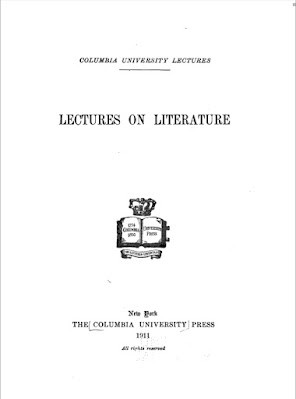Columbia University Lectures: Lectures On Literature (1911)
These lectures by members of the Faculty of Columbia University were delivered, with one exception, during the academic year 1909-1910.
CONTENTS INTRODUCTION LECTURE PAGE
I
APPROACHES TO LITERATURE
By Brander Matthews, Professor of Dramatic Literature
ORIENTAL LITERATURES
II
SEMITIC LITERATURES
By Richard J H Gottheil, Professor of Rabbinical Literature and the Semitic Languages
III
THE LITERATURE OF INDIA AND PERSIA
By A V W Jackson, Professor of Indo-Iranian Languages
IV
CHINESE LITERATURE
By Friedrich Hirth, Professor of Chinese
CLASSICAL LITERATURES
V
GREEK LITERATURE
By Edward Delavan Perry, Jay Professor of Greek
VI
LATIN LITERATURE
By Nelson Glenn McCrea, Professor of Latin
LITERARY EPOCHS
VII
THE MIDDLE AGES
By William Witherle Lawrence, Associate Professor of English
VIII
THE RENAISSANCE
By Jefferson B Fletcher, Professor of Comparative Literature
IX
THE CLASSICAL RULE
By John Erskine, Associate Professor of English
X
THE ROMANTIC EMANCIPATION
By Curtis Hidden Page, sometime Adjunct Professor of the Romance Languages and Literatures
MODERN LITERATURES
XI
ITALIAN LITERATURE IN THE EIGHTEENTH CENTURY
By Carlo L Speranza, Professor of Italian
SPANISH LITERATURE
By Henry Alfred Todd, Professor of Romance Philology
XIII
ENGLISH LITERATURE
By Ashley H Thorndike, Professor of English
XIV
FRENCH LITERATURE
By Adolphe Cohn, Professor of the Romance Languages and Literatures
XV
GERMAN LITERATURE
By Calvin Thomas, Gerhard Professor of the Germanic Languages and Literatures
XVI
RUSSIAN LITERATURE
By J A Joffe, Lecturer on Slavonic Literature
XVII
THE COSMOPOLITAN OUTLOOK
By William P Trent, Professor of English Literature
CONCLUSION
XVIII
LITERARY CRITICISM
By J E Spingarn, Professor of Comparative Literature
INDEX
The PDF might take a minute to load. Or, click to download PDF.
If your Web browser is not configured to display PDF files. No worries, just click here to download the PDF file.



No comments:
Post a Comment